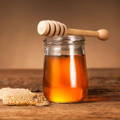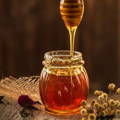
The Remarkable Health Benefits of Raw Honey
Discover the remarkable benefits of raw and unfiltered honey! From wound treatment and immune support to aiding digestion and brain health, this natural sweetener is packed with antioxidants and antibacterial properties. Learn why choosing raw and unfiltered honey is essential for preserving its valuable nutrients and promoting overall well-being.
FUN FACT: Honey never spoils. Honey is one of the few foods known to have an eternal shelf life.
Subscribe
To join our mailing list and never miss an update!
Raw honey has historically served as a medicinal remedy with numerous health benefits and medical applications. In fact, it is utilized in certain healthcare facilities and veterinary clinics for wound treatment. These unique health advantages are exclusively attributed to the natural state of raw and unfiltered honey.
Choose Raw and Unfiltered Honey
Most of the honey available in supermarkets has undergone a process called pasteurization. This technique involves subjecting the honey to high temperatures in order to eliminate yeast, improve its appearance and texture and slow crystallization. However, this process also results in the loss of many valuable nutrients found in raw honey.
To ensure you are purchasing raw honey, look for products that are explicitly labeled as "raw" or buy from farms that can guarantee their honey has not been pasteurized. It's important to be cautious when encountering terms like "natural," "organic," or "pure," because they don't necessarily indicate that the honey is raw.
Similarly, choose a honey that is unfiltered. The filtering process removes pollen and propolis. Both of these natural components of honey provide valuable health benefits and healing properties that are desirable to your immune system.
Gypsy Shoals Farm produces only raw and unfiltered honey so that you gain all the health benefits that honey has to offer.
1. Honey Has Antibacterial and Antifungal Properties
Honey has been known for its antibacterial and antifungal properties for thousands of years, and modern scientific research has provided insights into the factors that contribute to these properties:
• Low water content: Honey has a very low moisture content, typically below 18%. The lack of water creates an environment where most bacteria and fungi cannot survive and reproduce. When microorganisms are exposed to honey, the water is drawn out of their cells through osmosis, causing dehydration and ultimately killing them.
• High sugar content: Honey is predominantly composed of sugars like glucose and fructose. These sugars play a significant role in the osmotic effect mentioned earlier. The high sugar concentration in honey helps inhibit the growth and survival of bacteria and fungi.
• Low pH: Honey is acidic, with a pH range between 3.2 and 4.5, which is inhospitable to many bacteria and fungi. The acidity can hinder their growth and reduce their ability to cause infections.
• Hydrogen peroxide: Honey contains small amounts of hydrogen peroxide, a potent antiseptic agent. This compound is formed enzymatically in honey from glucose and oxygen, contributing to its antibacterial and antifungal properties.

Honey has been known for its antibacterial and antifungal properties for thousands of years, and modern scientific research has provided insights into the factors that contribute to these properties:
• Low water content: Honey has a very low moisture content, typically below 18%. The lack of water creates an environment where most bacteria and fungi cannot survive and reproduce. When microorganisms are exposed to honey, the water is drawn out of their cells through osmosis, causing dehydration and ultimately killing them.
• High sugar content: Honey is predominantly composed of sugars like glucose and fructose. These sugars play a significant role in the osmotic effect mentioned earlier. The high sugar concentration in honey helps inhibit the growth and survival of bacteria and fungi.
• Low pH: Honey is acidic, with a pH range between 3.2 and 4.5, which is inhospitable to many bacteria and fungi. The acidity can hinder their growth and reduce their ability to cause infections.
• Hydrogen peroxide: Honey contains small amounts of hydrogen peroxide, a potent antiseptic agent. This compound is formed enzymatically in honey from glucose and oxygen, contributing to its antibacterial and antifungal properties.
• Bee-derived components: Bees add specific substances to honey during the production process that may contribute to its antimicrobial properties. These components can include bee defensin-1, an antimicrobial peptide that bees produce and transfer to honey.
• Phytochemicals: Honey contains various phytochemicals that are derived from the nectar collected by bees from different plants. Some of these compounds, like flavonoids and phenolic acids, possess antimicrobial properties, adding to honey's overall effectiveness.
When honey is applied to a wound and covered with a bandage, it utilizes its natural antibacterial and antifungal agents to protect both human and pet wounds from infections.
2. Honey Helps Allergies
Honey has been popularly promoted as a natural remedy for allergies, particularly seasonal allergies like hay fever. The idea behind using honey to help with allergies is based on the concept of immunotherapy or desensitization. Here's how honey is thought to provide relief for some allergy sufferers:
• Exposure to Pollen: Honey is made by bees from the nectar of flowers, and during this process, minute traces of pollen from various plants can be found in the honey. By consuming local raw and unfiltered honey, you expose yourself to small amounts of the same pollen that may be triggering your allergies. Over time, this exposure may lead to a reduction in your sensitivity to these specific pollens.
• Desensitization: The concept of desensitization is that by gradually exposing yourself to an allergen (in this case, the pollen in honey), your immune system will become less reactive to it. This reduces the allergic response when you encounter the same pollen in the air during allergy season.
Trending Articles

3. Honey Contains Nutritional Supplements
Raw honey contains trace amounts of several essential micronutrients, including: calcium, magnesium, manganese, niacin, pantothenic acid, phosphorus, potassium, riboflavin, and zinc.
Moreover, raw honey is a rich source of diverse amino acids, enzymes, and other beneficial compounds that contribute to its nutritional value.
4. Honey Contains Antioxidants
Raw honey is a natural source of diverse plant chemicals that exhibit antioxidant properties. Some varieties of honey contain antioxidants comparable to those found in fruits and vegetables. Antioxidants play a vital role in shielding the body from cell damage caused by free radicals.
These free radicals not only contribute to the aging process but also play a role in the development of chronic ailments like cancer and heart disease. Scientific studies indicate that raw honey's antioxidant compounds, particularly polyphenols, possess anti-inflammatory effects that could offer protection against conditions linked to oxidative stress.

Moreover, raw and unfiltered honey contains bee pollen and bee propolis, which provide additional health benefits. The consumption of raw and unfiltered honey is believed to offer protective effects for the respiratory, gastrointestinal, cardiovascular, and nervous systems. There is even emerging evidence suggesting its potential in cancer treatment.
5. Honey Helps Your Memory and Brain Health
Honey has several potential ways it may positively impact the brain and cognitive function, although it's essential to note that the scientific research on these effects is still evolving. Here are some ways honey might help the brain:
• Brain Fuel: Honey is primarily composed of carbohydrates in the form of glucose and fructose, providing a quick and easily accessible source of energy for the brain. Glucose is the brain's primary fuel, and a steady supply of glucose is essential for optimal brain function.
• Memory and Learning: Some animal studies suggest that honey might have a positive impact on memory and learning abilities. Certain honey components, like polyphenols, may enhance synaptic plasticity, the process that underlies learning and memory in the brain.

• Neuroprotective Effects: Honey has shown potential in protecting brain cells from damage and supporting neuronal health. This may be attributed to its antioxidant and anti-inflammatory properties, which help guard against neurotoxicity and promote brain cell survival.
• Gut-Brain Axis: Emerging research indicates that the gut microbiota can influence brain health through the gut-brain axis. Honey has prebiotic properties, meaning it can promote the growth of beneficial gut bacteria, which may have indirect positive effects on brain function.
• Anti-Inflammatory Effects: Chronic inflammation in the brain can contribute to cognitive impairment and neurodegenerative diseases. Some compounds in honey, such as polyphenols and other bioactive substances, have anti-inflammatory properties that may help reduce brain inflammation.
• Antioxidant Properties: Honey contains various antioxidants, including polyphenols, which can help protect the brain from oxidative stress. Oxidative stress is linked to age-related cognitive decline and neurodegenerative diseases, and antioxidants can counteract the damage caused by free radicals in the brain.

6. Honey Soothes Stomach and Digestion Issues
Raw honey may offer several benefits that can aid digestion issues. Here are some ways raw honey may help with digestive problems:
• Soothing Properties: Raw honey has a natural ability to soothe the digestive tract due to its smooth texture and anti-inflammatory properties. Consuming a small amount of raw honey may help alleviate discomfort and irritation in the gastrointestinal system.
• Prebiotic Effects: Honey contains prebiotic compounds, which means it provides nourishment for beneficial gut bacteria. These bacteria play a crucial role in maintaining a healthy gut environment and promoting proper digestion. By supporting the growth of beneficial bacteria, raw honey may help improve overall digestive health.
• Acid Reflux Relief: Consuming honey offers relief from acid reflux symptoms. The honey soothes the lining of the esophagus and reduces irritation caused by stomach acid.
• Constipation Relief: Raw honey has mild laxative properties, and consuming it with warm water or herbal tea may help relieve constipation by promoting bowel movements and easing stool passage.
• Antimicrobial Properties: Raw honey has long been known for its antimicrobial effects. It can help combat harmful bacteria in the digestive tract, which may contribute to digestive issues or infections. Additionally, the antimicrobial properties of honey may assist in maintaining a balanced gut microbiome.
• Natural Enzymes: Raw honey contains natural enzymes, which can aid in the breakdown of certain foods during digestion. These enzymes may assist the body in more effectively processing and absorbing nutrients.
While raw honey can be beneficial for digestion, it's essential to consume it in moderation. Honey is a concentrated source of sugars, and excessive consumption can lead to digestive discomfort, particularly in individuals with sensitive digestive systems or those prone to irritable bowel syndrome (IBS).

In summary, raw and unfiltered honey is not just a natural sweetener, but also a highly beneficial substance. Throughout history, its numerous health advantages have been revered, and ongoing scientific research continues to unveil its remarkable properties.
With its powerful antioxidants, antibacterial properties, and anti-inflammatory effects, raw and unfiltered honey can enhance digestion, promote wound healing, and strengthen the immune system. Additionally, it has the potential to alleviate allergy symptoms and soothe coughs.
While further studies are necessary for a complete understanding of its benefits, incorporating this golden elixir into a well-balanced diet can provide a holistic approach to nourishing the body and promoting overall well-being.
Copyright©2023 All rights reserved. We love to have you share our article as long as you include a direct link to this page. Please contact us for permission and we’ll be happy to collaborate. This article or any portion thereof , including all images, may not be reproduced or used in any manner whatsoever without the express written permission of Gypsy Shoals Farm.





